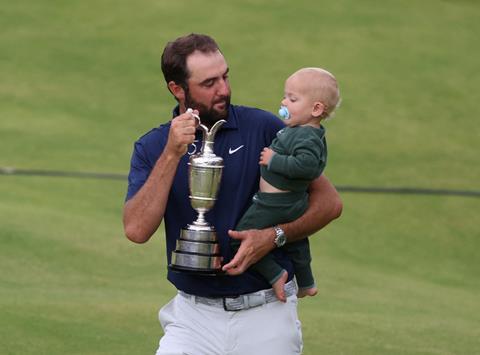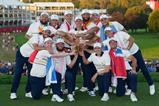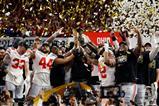The world’s best golfer dominated this year’s British Open. But it was Scottie Scheffler’s pre-event press conference that garnered the most headlines. Scheffler loves golf, he says, but he loves God and his family more. It’s a great perspective that deserves to be properly understood, says Jonny Reid

Scottie Scheffler is not a nihilist.
At least, I don’t think so. I’ve never met him. But the comments that sent the golfing world into a frenzy before this year’s Open championships come not because he said something shocking - but because he said the quiet part out loud.
“This is not a fulfilling life,” he admitted during a thoughtful press conference before teeing off as the tournament favourite at The Open in Royal Portrush.
Sport - even when you’re the world number one - isn’t meant to fulfil us completely. It can’t. And Scottie Scheffler had the honesty and courage to say that.
Scheffler reminds us that faith in Jesus gives us the freedom to care deeply without being consumed; to strive without being enslaved
“There are a lot of people that make it to what they thought was going to fulfil them in life… You get to number one in the world and they’re like, ‘What’s the point?’ I really do believe that, because what is the point? Why do I want to win this tournament so bad? It’s something that I wrestle with on a daily basis.”
Scheffler isn’t the first sportsperson to express this sentiment, but he may be the first to say it from the very top.
A stonecutter culture
Have you heard the fable of the stonecutter?
A poor man, content in his hard life, delivers a stone to the house of a rich merchant. Envy strikes. He wishes to be a merchant - and his wish is granted. But then he sees a prince, then the sun, then a cloud, then a mountain - each more powerful than the last - and wishes to become each one in turn.
But in the end, he finds his greatest power was simply to be the stonecutter.
Scottie Scheffler, in our eyes, has become the mountain - the world number one golfer. And yet, he admits that it hasn’t satisfied him. That seemed to puzzle many in the golfing media, who have long fantasised about standing where he stands.
In a culture that prizes upward momentum and achievement as the highest form of self-worth, we simply cannot comprehend someone reaching the top and saying: “It’s not enough.”
Scheffler is wealthy, successful and happily married - by most standards, he has everything. And yet he confesses that, in eternal terms, everything is really nothing.
Life as a gift, not gain
In the fable, the stonecutter comes full circle. He learns that true power lies in being who he already was. For Scheffler, the restlessness of sport finds peace in an identity outside of himself.
He’s spoken openly about the tension he feels: that golf is both deeply important and entirely irrelevant. As sports journalist Kyle Porter put it: “He holds the line between ‘cares a lot’ and ‘identity not tethered to outcome’ perfectly.”
That’s because, as Scheffler has said before, his identity is rooted not in performance but in faith in God.
On the day of his 2024 Masters win, friends reminded him that his true victory was secured on the cross. Scheffler later reflected: “That’s a pretty special feeling to know that I’m secure for forever, and it doesn’t matter if I win or lose this tournament.”
But this doesn’t mean golf is not important to him, or that he doesn’t enjoy or appreciate it. Lost in the philosophical weight of his comments before the start of the tournament was this joy: “I love being able to play this game for a living. It’s one of the greatest joys of my life. But does it fill the deepest wants and desires of my heart? Absolutely not. This is not the be-all and end-all.”
In other words, two things can be true at once: Sport is good. But it’s not ultimate.
The wisdom of Ecclesiastes
The writer of Ecclesiastes says it like this: “Meaningless! Meaningless! …Everything is meaningless” (Ecclesiastes 1:2).
The Hebrew word used here, hebel, doesn’t mean “worthless” so much as “vapor” - fleeting, insubstantial, elusive. Life is real, but not graspable. Beautiful, but not controllable. Important, but not ultimate.
In a culture that prizes achievement as the highest form of self-worth, we cannot comprehend someone reaching the top and saying: “It’s not enough”
In his commentary on the book of Ecclesiastes, Living Life Backward (Crossway), David Gibson writes: “By relativizing all that we do… death can change us from people who want to control life for gain into people who find deep joy in receiving life as a gift.”
That’s what Scheffler seems to grasp. His honesty is Ecclesiastes in real-time: “It’s an unsatisfying venture. I love competing, but it’s not what satisfies me.”
Be more Scottie
Saying the quiet part out loud is a good place to begin. God’s word interrupts us not to condemn joy, but to redirect our hunger to the one who gave us joy in the first place. Sports, success, family are all good gifts. But they aren’t the Giver.
As Ecclesiastes teaches, we are not meant to avoid life, but to enjoy it with the end in view. That doesn’t detach us from the world - it roots us deeper in gratitude for every good and imperfect thing.
We can enjoy our passions - like golf - not as our identity, but as expressions of the God who made us. We can love our families, serve others and pursue excellence without envy or striving for significance.
Scheffler reminds us that faith in Jesus gives us the freedom to care deeply without being consumed; to strive without being enslaved.
So, friends: hold lightly to the things of this world but find great pleasure and joy in them.
Recognise they are not ultimate, but they are good.
Live with the end in view.
And when the quiet part rises up in your heart - say it out loud. That’s where real life begins.





































No comments yet